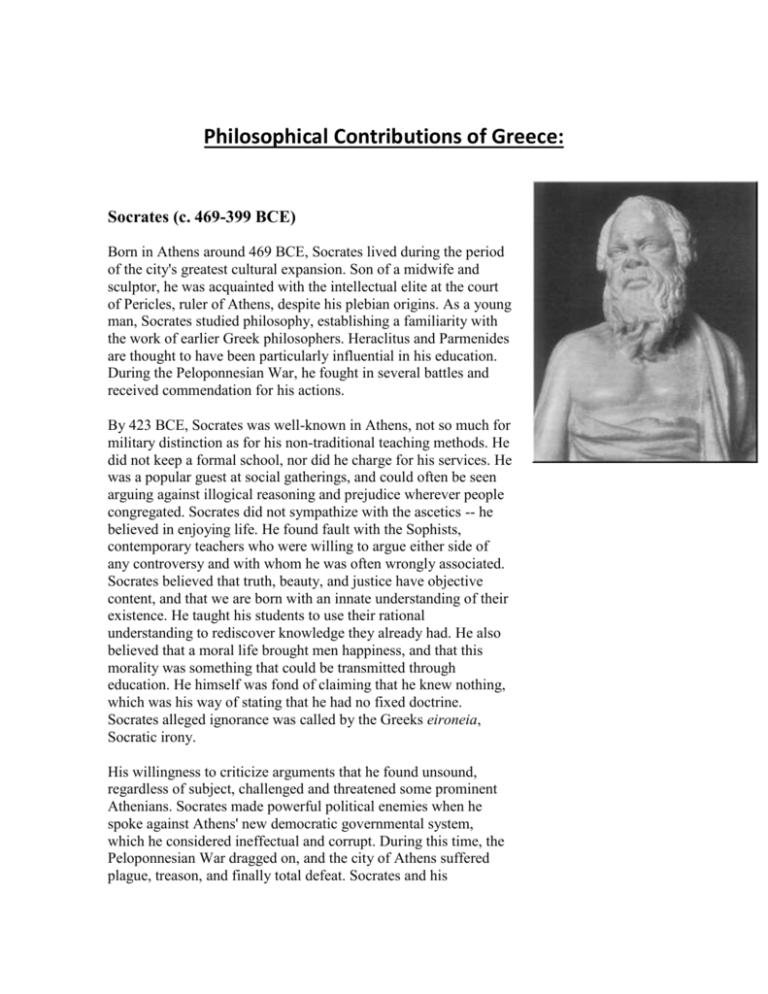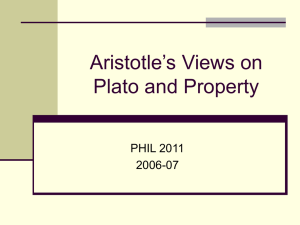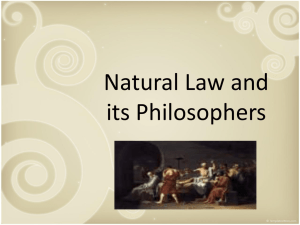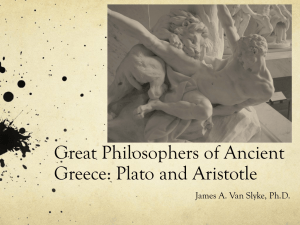Philosophical Contributions of Greece
advertisement

Philosophical Contributions of Greece: Socrates (c. 469-399 BCE) Born in Athens around 469 BCE, Socrates lived during the period of the city's greatest cultural expansion. Son of a midwife and sculptor, he was acquainted with the intellectual elite at the court of Pericles, ruler of Athens, despite his plebian origins. As a young man, Socrates studied philosophy, establishing a familiarity with the work of earlier Greek philosophers. Heraclitus and Parmenides are thought to have been particularly influential in his education. During the Peloponnesian War, he fought in several battles and received commendation for his actions. By 423 BCE, Socrates was well-known in Athens, not so much for military distinction as for his non-traditional teaching methods. He did not keep a formal school, nor did he charge for his services. He was a popular guest at social gatherings, and could often be seen arguing against illogical reasoning and prejudice wherever people congregated. Socrates did not sympathize with the ascetics -- he believed in enjoying life. He found fault with the Sophists, contemporary teachers who were willing to argue either side of any controversy and with whom he was often wrongly associated. Socrates believed that truth, beauty, and justice have objective content, and that we are born with an innate understanding of their existence. He taught his students to use their rational understanding to rediscover knowledge they already had. He also believed that a moral life brought men happiness, and that this morality was something that could be transmitted through education. He himself was fond of claiming that he knew nothing, which was his way of stating that he had no fixed doctrine. Socrates alleged ignorance was called by the Greeks eironeia, Socratic irony. His willingness to criticize arguments that he found unsound, regardless of subject, challenged and threatened some prominent Athenians. Socrates made powerful political enemies when he spoke against Athens' new democratic governmental system, which he considered ineffectual and corrupt. During this time, the Peloponnesian War dragged on, and the city of Athens suffered plague, treason, and finally total defeat. Socrates and his outspoken opinions became increasingly aggravating to the ruling elite. It was thought that his influence over the youth of Athens was dangerous, particularly his association with Critias, a former student and a powerful figure in the Rule of Thirty, a tyrannic government that came to power in Athens after the period of political flux in the aftermath of the Peloponnesian War. While some of the members of this oligarchy had indeed been followers of Socrates, Socrates remained an outspoken critic of the new government. When the Democrats regained power, however, Socrates' association with the oligarchy, particularly with Critias and Alcibiades, gave his enemies reason to bring him to trial. He was charged with corrupting the youth of Athens and with impiety. Despite his eloquent defense, Socrates was found guilty and sentenced to death. Plato records Socrates's last month of life in jail in the Apology, the Phaedo, and the Crito. Socrates remained staunchly true to his beliefs, refused to recant any of his statements, and also refused to accept exile over death. He took a cup of hemlock surrounded by his friends, and, comforting them, drank the poison that would end his life. Socrates is considered to be among the most influential Western philosophers. Although he never wrote a word himself, the many works of his student, Plato, provides a window into Socratic philosophy. His major contribution to the study of philosophy was to redirect inquiries away from the natural sciences and toward the contemplation of systems of ethics and questions of ethical conduct. Plato (c. 427-347 BCE) Plato was Socrates' student and one of the most influential philosophers in Western civilization. Born to a politically active and wealthy noble Athenian family, (Plato's mother was descended from Solon, the famous lawgiver credited with major democratic reforms that paved the way for Athen's Golden Age) Plato grew up during the Peloponnesian War (431-404 BCE), a conflict that arose among Athens, Sparta, and their allies. This civil war was the beginning of the end of the Athenian Golden Age, and created an opening for later conquest by Philip of Macedon. The principles of democracy in Athens were lost, as was much of the cultural wealth of both city states. During this general shift away from democracy, Plato was a young man, and probably served in the military around 409-404 BCE. The Rule of the Thirty, a period of tyrannical government, replaced the last vestiges of democracy before Plato reached adulthood. Though Sparta emerged victorious in battle, the balance of power between the two city states remained uncertain, with neither state gaining a clear economic or political advantage. His relatives Critias and Charmides introduced Plato to Socrates and his radical and vibrant philosophical group. Socrates became Plato's teacher from 469-399 BCE. Plato was deeply influenced by Socrates' emphasis on ethics and politics, and would later commemorate Socrates as the wise and central speaker in his philosophical writings.When Athens lost the Peloponnesian War, Critias and Charmides, the same relatives who had established Plato in Athens, became part of the despotic Rule of Thirty, also known as the Thirty Tyrants. When the government of the Rule of Thirty crumbled in 403 BCE, Critias and Charmides were executed. Socrates was then put to death in 399 BCE, not by the Rule of Thirty, but by the newly reinstated and corrupt Athenian democratic system. Plato gave up all political aspirations after this tragedy, and pursued instead a career of travel and philosophy. He travelled to the Greek city of Syracuse in Sicily around 387 BCE, ruled by the despotic Dionysius, where he tutored and befriended Dion, a relative of the king. During his journeying in Italy Plato encountered followers of Pythagoras, an early philosopher whose views on the soul and the afterlife seem to have greatly influenced Plato. Plato would also have been intrigued by tales of a Pythagorean class of philosopherelites who had ruled over some of the Greek cities in Italy, an idea that would resurface in his Republic . Plato's visit to Syracuse, however, ended abruptly -- one legend suggests that Dionysius was annoyed by Plato's critical comments and tried to sell him as a slave -- and Plato came back to Athens in 386 BCE to found his school in a place dedicated to Academus, a mythical hero. The Academy among the first organized institutions of higher education in the Western world. He remained at the Academy for the next twenty years until drawn away from his work there in 367 BCE by a request from Dion, his old friend from Syracuse, to return to Sicily. Plato probably made the voyage with the expectation that he could be instrumental in forming a new state in Syracuse, one dedicated to philosophical ideals. In 361 BCE, however, he returned to Athens, feeling that Sicily's problems were too great for one man to overcome. His return to Athens was marked by the arrival of a brilliant student to the Academy named Aristotle, whom Plato taught for the next twenty years until his death in 347 BCE, according to legend, with his pen still in his hand. Plato composed over twenty dialogues, (the dialogue itself was then a revolutionary prose form) as well as a series of philosophical letters. Although most of the letters are thought to be forged, the "Seventh Letter" contains information about Plato's life that most scholars believe to be accurate. Almost all of Plato's works were lost during the Middle Ages, except for the first third of the Timaeus. His writings were not recovered until the fourteenth and fifteenth centuries, when Italian humanists gradually rediscovered and translated his works into Latin. From this point forward, Plato's texts, and his magnum opus The Republic , in particular, have had an impact on European history second only to the works of Aristotle. Particularly influential was his theory of Forms, in which Plato suggested that the reality of corporeal and materials things is based on a metaphysical reality of ideas that exists in an eternal world of Forms. Plato's idea of a an absolute Form of the Good was close to the Christian monotheistic God; Neoplatonism in the Christianizing Roman Empire (100-400 CE) revived Plato as an early precursor of Christian doctrine. Aristotle (c. 384-322 BCE) Aristotle, or Aristoteles, (c.384-322 BCE) was born in Stagirus in the Greek colony of Chalcidice, which lies to the north of Greece near Macedon. Aristotle was never an Athenian citizen, despite having spent most of his life in Athens. Nicomachus, Aristotle's father, was court physician to King Amyntas III of Macedon. Aristotle came to Athens to study and joined Plato's Academy in 367 BCE. Aristotle became Plato's best student and was generally felt to be Plato's successor. He remained at the Academy until Plato's death in 347 BCE, when, bypassed in the election of the Academy's next president, Aristotle left Athens with a few students and friends. He journeyed to the eastern Mediterranean and Asia Minor, where he established a school at Assos at the behest of the ruling Persian vassal, Hermias. Aristotle married Pythias, Hermia's adopted daughter. When Hermias fell out of favor with the Persian authorities and was executed, Aristotle and his followers fled to the Greek island of Lesbos. Here, Aristotle met Theophrastus, his successor. It was also at Lesbos that Aristotle made some of his most famous zoological observations and marine experiments in biology. In 343 BCE, Aristotle returned to Macedon at the invitation of King Philip.For three years he became the tutor of the adolescent Alexander the Great. Aristotle returned to Athens to found his own school, the Lyceum, in 355 BCE, after Alexander had assumed the throne. The Lyceum had a special status. Alexander had made a large donation to his former tutor's new enterprise, and additionally the Lyceum was under Macedonian protection. At the Lyceum, Aristotle had the freedom to pursue a vast number of scientific and philosophic interests. He developed a course of study that in many ways resembles the modern Western university system. In fact, many of Aristotle's surviving works were probably intended as notes for his advanced courses. He also gave lectures to the general public. His philosophical school was known as "Peripatetic," either because Aristotle had a habit of walking around while addressing his audience, or because the roofed courtyard at the Lyceum was called a peripatos . Aristotle's good years in Athens did not last. Alexander died during his great Eastern campaign in 323 BCE, and the withdrawal of Macedonian power and protection from Aristotle's Athenian school gave his enemies the opportunity to charge him with impiety. Aristotle fled to Chalcis, explaining, according to legend, that he would not give the Athenians a chance to commit another sin against philosophy (referring to the execution of Socrates on a similar charge in 399 BCE). He died the following year at the age of sixty-two. Despite the fact that only around thirty Aristotelean treatises remained extant, Aristotle's work has directed academic pursuits in the West since the middle ages. Among his most influential works are Politics, Physics, Metaphysics, Generation of Animals , History of Animals, Nicomachean Ethics (named after his son, Nicomachus, who is thought to have edited his father's work), Rhetoric , Poetics , On the Heavens, Meteorology, and Prior Analytics . Aristotle's work might be viewed as an attempt to reconcile naturalism, as posited by the pre-Socratics, with the metaphysical world described by his teacher, Plato.Ultimately, Aristotle would repudiate Plato's metaphysical understanding of the world. Aristotle preferred (and indeed developed) the processes of scientific observation and experimentation in the material world. He is credited with establishing systems and categories of scholarly research that have survived to the present day. Aristotle's work has been critical in the development of much of Western philosophic thought through to the nineteenth century.








